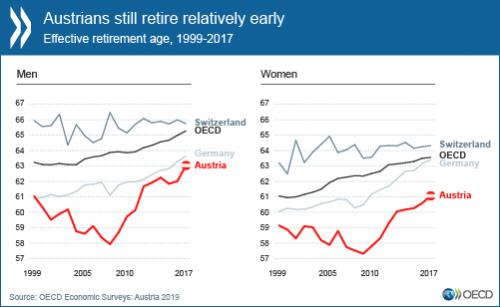Austria: reforms will be necessary to uphold high well-being levels
Austria stands out for its high levels of economic and social well-being. Preserving these will require reforms to improve competition in the service sector, increase access to risk capital for firms of all sizes, encourage more women and migrants into the workforce and lengthen work lives to reflect the ageing population, according to a new OECD report.

The latest OECD Economic Survey of Austria, presented in Vienna by the OECD’s Director of Country Studies Alvaro Pereira, projects GDP growth of 1.4% for 2019 and 1.3% for 2020. The 2020 projection is down from 1.6% forecast by the OECD in May, though the 2019 projection is unchanged, as recruitment bottlenecks, weakening external demand – especially from key markets Germany and Italy – and global trade tensions dampen Austria’s outlook.
The report’s key recommendations include linking the retirement age to life expectancy, which has risen steadily while Austrians are still retiring much earlier than the OECD average. The effective retirement age in Austria is notably lower than in neighbouring Germany and Switzerland. Austria’s labour participation rate is also low, especially among older women.
To increase the incentives to stay in work, the report recommends Austria do more to reduce its high levels of tax and social security on labour income, particularly for low earners, relative to most other OECD countries. This could be balanced by shifting to alternative sources of taxation such as environmental, consumption, inheritance and wealth taxes.
Reducing barriers to entry in key sectors ranging from service professions and specialist manufacturing to rail and freight transport and pharmaceutical distribution could bolster competition and economic dynamism. The small and medium-sized businesses that dominate Austria’s economy would benefit from greater access to venture capital and a better developed equity market. A reform planned by the outgoing government to address the debt-bias in the corporate tax system would help level the playing field between debt and equity financing.
The report recommends making access to quality childcare, early childhood education and all-day schooling for older children a legal entitlement throughout the country, to make it easier for new mothers to return to work and improve their career prospects. While this is a challenge given Austria’s geography, it would also contribute to more equal opportunities in the education system.
Austria has one of the highest shares of migrants in its workforce of OECD countries. This means migrants play an important role in meeting robust demand for labour yet the country also has a major challenge in trying to integrate low-skilled immigrants. Increasing the availability of language courses and adult skills training would help to address this.
The report also calls for Austria to increase its focus on environmental issues, for example by increasing carbon prices, which are low by international standards, and improving town planning to address the rising environmental impact of urban sprawl.
Source: Organisation for Economic Co-operation and Development
- 288 reads
Human Rights
Ringing FOWPAL’s Peace Bell for the World:Nobel Peace Prize Laureates’ Visions and Actions

Protecting the World’s Cultural Diversity for a Sustainable Future

The Peace Bell Resonates at the 27th Eurasian Economic Summit

Declaration of World Day of the Power of Hope Endorsed by People in 158 Nations

Puppet Show I International Friendship Day 2020

